- Home
- Michael Crichton
The Lost World Page 12
The Lost World Read online
Page 12
His other concern was the batteries themselves. Thorne had selected the new lithium-ion batteries from Nissan, which were extremely efficient on a weight basis. But they were still experimental, which to Eddie was just a polite word for “unreliable.”
Eddie had argued for backups; he had argued for a little gasoline-generator, just in case; he had argued for lots of things. And he had always been voted down. Under the circumstances, Eddie did the only sensible thing: he built in a few extras, and didn’t tell anybody about it.
He was pretty sure Thorne knew he had done that. But Thorne never said anything. And Eddie never brought it up. But now that he was here, on this island in the middle of nowhere, he was glad he had. Because the fact was, you never knew.
Thorne watched as Eddie backed the Explorer out of the container, and into the high grass. Eddie left the car in the middle of the clearing, where the sunlight would strike the panels and top up the charge.
Thorne got behind the wheel of the first trailer, and backed it out. It was odd to drive a vehicle which was so quiet; the loudest sound was the tires on the metal container. And once it was on the grass, there was hardly any sound at all. Thorne climbed out, and linked up the two trailers, locking them together with the flexible steel accordion connector.
Finally, he turned to the motorcycle. It, too, was electric; Thorne rolled it to the rear of the Explorer, lifted it onto brackets, hooked the power cord into the same system that ran the vehicle, and recharged the battery. He stepped back. “That does it.”
In the hot, quiet clearing, Eddie stared toward the high circular rim of the crater, rising in the distance above the dense jungle. The bare rock shimmered in the morning heat, the walls forbidding and harsh. He had a sense of desolation, of entrapment. “Why would anyone ever come here?” he said.
Malcolm, leaning on his cane, smiled. “To get away from it all, Eddie. Don’t you ever want to get away from it all?”
“Not if I can help it,” Eddie said. “Me, I always like a Pizza Hut nearby, you know what I mean?”
“Well, you’re a ways from one now.”
Thorne returned to the back panel of the trailer, and pulled out a pair of heavy rifles. Beneath the barrel of each hung two aluminum canisters, side by side. He handed one rifle to Eddie, showed the other to Malcolm. “You ever seen these?”
“Read about them,” Malcolm said. “This is the Swedish thing?”
“Right. Lindstradt air gun. Most expensive rifle in the world. Rugged, simple, accurate, and reliable. Fires a subsonic Fluger impact-delivery dart, containing whatever compound you want.” Thorne cracked open the cartridge bank, revealing a row of plastic containers filled with straw-colored liquid. Each cartridge was tipped with a three-inch needle. “We’ve loaded the enhanced venom of Conus purpurascens, the South Sea cone shell. It’s the most powerful neurotoxin in the world. Acts within a two-thousandth of a second. It’s faster than the nerve-conduction velocity. The animal’s down before it feels the prick of the dart.”
“Lethal?”
Thorne nodded. “No screwing around here. Just remember, you don’t want to shoot yourself in the foot with this, because you’ll be dead before you realize that you’ve pulled the trigger.”
Malcolm nodded. “Is there an antidote?”
“No. But what’s the point? There’d be no time to administer it if there was.”
“That makes things simple,” Malcolm said, taking the gun.
“Just thought you ought to know,” Thorne said. “Eddie? Let’s get going.”
The Stream
Eddie climbed into the Explorer. Thorne and Malcolm climbed into the cab of the trailer. A moment later, the radio clicked. Eddie said, “You putting up the database, Doc?”
“Right now,” Thorne said.
He plugged the optical disk into the dashboard slot. On the small monitor facing him, he saw the island appear, but it was largely obscured behind patches of cloud. “What good is that?” Malcolm said.
“Just wait,” Thorne said. “It’s a system. It’s going to sum data.”
“Data from what?”
“Radar.” In a moment, a satellite radar image overlaid the photograph. The radar could penetrate the clouds. Thorne pressed a button, and the computer traced the edges, enhancing details, highlighting the faint spidery track of the road system.
“Pretty slick,” Malcolm said. But to Thorne, he seemed tense.
“I’ve got it,” Eddie said, on the radio.
Malcolm said, “He can see the same thing?”
“Yes. On his dashboard.”
“But I don’t have the GPS,” Eddie said, anxiously. “Isn’t it working?”
“You guys,” Thorne said. “Give it a minute. It’s reading the optical. Waystations are coming up.”
There was a cone-shaped Global Positioning Sensor mounted in the roof of the trailer. Taking radio data from orbiting navigation satellites thousands of miles overhead, the GPS could calculate the position of the vehicles within a few yards. In a moment, a flashing red X appeared on the map of the island.
“Okay,” Eddie said, on the radio. “I got it. Looks like a road leading out of the clearing to the north. That where we’re going?”
“I’d say so,” Thorne said. According to the map, the road twisted several miles across the interior of the island, before finally reaching a place where all the roads seemed to meet. There was the suggestion of buildings there, but it was hard to be sure.
“Okay, Doc. Here we go.”
Eddie drove past him, and took the lead. Thorne stepped on the accelerator, and the trailer hummed forward, following the Explorer. Beside him, Malcolm was silent, fiddling with a small notebook computer on his lap. He never looked out the window.
In a few moments, they had left the clearing behind, and were moving through dense jungle. Thorne’s panel lights flashed: the vehicle switched to its batteries. There wasn’t enough sunlight coming through the trees to power the trailer any more. They drove on.
“How you doing, Doc?” Eddie said. “You holding charge?”
“Just fine, Eddie.”
“He sounds nervous,” Malcolm said.
“Just worried about the equipment.”
“The hell,” Eddie said. “I’m worried about me.”
Although the road was overgrown and in poor condition, they made good progress. After about ten minutes, they came to a small stream, with muddy banks. The Explorer started across it, then stopped. Eddie got out, stepping over rocks in the water, walking back.
“What is it?”
“I saw something, Doc.”
Thorne and Malcolm got out of the trailer, and stood on the banks of the stream. They heard the distant cries of what sounded like birds. Malcolm looked up, frowning.
“Birds?” Thorne said.
Malcolm shook his head, no.
Eddie bent over, and plucked a strip of cloth out of the mud. It was dark-green Gore-Tex, with a strip of leather sewn along one edge. “That’s from one of our expedition packs,” he said.
“The one we made for Levine?”
“Yes, Doc.”
“You put a sensor in the pack?” Thorne asked. They usually sewed location sensors inside their expedition packs.
“Yes.”
“May I see that?” Malcolm asked. He took the strip of cloth and held it up to the light. He fingered the torn edge thoughtfully.
Thorne unclipped a small receiver from his belt. It looked like an oversized pager. He stared at the liquid-crystal readout. “I’m not getting any signal. . . .”
Eddie stared at the muddy bank. He bent over again. “Here’s another piece of cloth. And another. Seems like the pack was ripped into shreds, Doc.”
Another bird cry floated toward them, distant, unworldly. Malcolm stared off in the distance, trying to locate its source. And then he heard Eddie say, “Uh-oh. We have company.”
There were a half-dozen bright-green lizard-like animals, standing in a group near the trailer.
They were about the size of chickens, and they chirped animatedly. They stood upright on their hind legs, balancing with their tails straight out. When they walked, their heads bobbed up and down in nervous little jerks, exactly like a chicken. And they made a distinctive squeaking sound, very reminiscent of a bird. Yet they looked like lizards with long tails. They had quizzical, alert faces, and they cocked their heads when they looked at the men.
Eddie said, “What is this, a salamander convention?”
The green lizards stood, watched. Several more appeared, from beneath the trailer, and from the foliage nearby. Soon there were a dozen lizards, watching and chittering.
“Compys,” Malcolm said. “Procompsognathus triassicus, is the actual name.”
“You mean these are—”
“Yes. They’re dinosaurs.”
Eddie frowned, stared. “I didn’t know they came so small,” he said finally.
“Dinosaurs were mostly small,” Malcolm said. “People always think they were huge, but the average dinosaur was the size of a sheep, or a small pony.”
Eddie said, “They look like chickens.”
“Yes. Very bird-like.”
“Is there any danger?” Thorne said.
“Not really,” Malcolm said. “They’re small scavengers, like jackals. They feed on dead animals. But I wouldn’t get close. Their bite is mildly poisonous.”
“I’m not getting close,” Eddie said. “They give me the creeps. It’s like they’re not scared.”
Malcolm had noticed that, too. “I imagine it’s because there haven’t been any human beings on this island. These animals don’t have any reason to fear man.”
“Well, let’s give them a reason,” Eddie said. He picked up a rock.
“Hey!” Malcolm said. “Don’t do that! The whole idea is—”
But Eddie had already thrown the rock. It landed near a cluster of compys, and the lizards ducked away. But the others hardly moved. A few of them hopped up and down, showing agitation. But the group stayed where they were. They just chittered, and cocked their heads.
“Weird,” Eddie said. He sniffed the air. “You notice that smell?”
“Yes,” Malcolm said. “They have a distinctive odor.”
“Rotten, is more like it,” Eddie said. “They smell rotten. Like something dead. And you ask me, it’s not natural, animals that don’t show fear like that. What if they have rabies or something?”
“They don’t,” Malcolm said.
“How do you know?”
“Because only mammals carry rabies.” But even as he said it, he wondered if that was right. Warm-blooded animals carried rabies. Were the compys warm-blooded? He wasn’t sure.
There was a rustling sound from above. Malcolm looked up at the canopy of trees overhead. He saw movement in the high foliage, as unseen small animals jumped from branch to branch. He heard squeaks and chirps, distinctly animal sounds.
“Those aren’t birds, up there,” Thorne said. “Monkeys?”
“Maybe,” Malcolm said. “I doubt it.”
Eddie shivered. “I say we get out of here.”
He returned to the stream, and climbed into the Explorer. Malcolm walked cautiously with Thorne back to the trailer entrance. The compys parted around them, but still did not run away. They stood all around their legs, chittering excitedly. Malcolm and Thorne climbed into the trailer and closed the doors, being careful not to shut them on the little creatures.
Thorne sat behind the wheel, and turned on the motor. Ahead, they saw that Eddie was already driving the Explorer through the stream, and heading up the sloping ridge on the far side.
“The, uh, procomso-whatevers,” Eddie said, over the radio. “They’re real, aren’t they?”
“Oh yes,” Malcolm said softly. “They’re real.”
The Road
Thorne was uneasy. He was beginning to understand how Eddie felt. He had built these vehicles, and he had an uncomfortable sense of isolation, of being in this faraway place with untested equipment. The road continued steeply upward through dark jungle for the next fifteen minutes. Inside the trailer, it grew uncomfortably warm. Sitting beside him, Malcolm said, “Air conditioning?”
“I don’t want to drain the battery.”
“Mind if I open the window?”
“If you think it’s all right,” Thorne said.
Malcolm shrugged. “Why not?” He pushed the button, and the power window rolled down. Warm air blew into the car. He glanced back at Thorne. “Nervous, Doc?”
“Sure,” Thorne said. “Damned right I am.” Even with the window open, he felt sweat running down his chest as he drove.
Over the radio, Eddie was saying, “I’m telling you, we should have tested first, Doc. Should have done it by the book. You don’t come to a place with poisonous chickens if you’re not sure your vehicles will hold up.”
“The cars are fine,” Thorne said. “How’s your levels?”
“High normal,” Eddie said. “Just great. Of course, we’ve only gone five miles. It’s nine in the morning, Doc.”
The road swung right, then left, following a series of switchbacks as the terrain became steeper. Hauling the big trailers, Thorne had to concentrate on his driving; it was a relief to focus his attention.
Ahead of them, the Explorer turned left, going higher up the road. “I don’t see any more animals,” Eddie said. He sounded relieved.
Finally the road flattened out as it turned, following the crest of the ridge. According to the GPS display, they were now heading northwest, toward the interior of the island. But the jungle still hemmed them in on all sides; they could not see much beyond the dense walls of foliage.
They came to a Y intersection in the road, and Eddie pulled over to the side. Thorne saw that in the crook of the Y was a faded wooden sign, with arrows pointing in both directions. To the left, the sign said “To Swamp.” To the right was another arrow, and the words, “To Site B.”
Eddie said, “Guys? Which way?”
“Go to Site B,” Malcolm said.
“You got it.” The Explorer started down the right fork. Thorne followed. Off to the right, sulfurous yellow steam issued from the ground, bleaching the nearby foliage white. The smell was strong.
“Volcanic,” Thorne said to Malcolm, “just as you predicted.” Driving past, they glimpsed a bubbling pool in the earth, crusted thick yellow around the edges.
“Yeah,” Eddie said, “but that’s active. In fact, I’d say that—holy shit!” Eddie’s brake lights flashed on, and his car slammed to a stop.
Thorne had to swerve, scraping jungle ferns on the side of the trailer, to miss him. He pulled up alongside the Explorer, and glared at Eddie. “Eddie, for Pete’s sake, will you—”
But Eddie wasn’t listening.
He was staring straight forward, his mouth wide open.
Thorne turned to look.
Directly ahead, the trees along the road had been beaten down, creating a gap in the foliage. They could see all the way from the ridge road across the entire island to the west. But Thorne hardly registered the panoramic view. Because all he saw was a large animal, the size of a hippopotamus, ambling across the road. Except it wasn’t a hippopotamus. This animal was pale brown, its skin covered with large plate-like scales. Around its head, it had a curving bony crest, and rising from this crest were two blunted horns. A third horn protruded above its snout.
Over the radio, he heard Eddie breathing in shallow gasps. “You know what that is?”
“That’s a triceratops,” Malcolm said. “A young one, by the looks of it.”
“Must be,” Eddie said. Ahead of them, a much larger animal now crossed the road. It was easily twice the size of the first, and its horns were long, curving, and sharp. “Because that’s his mom.”
A third triceratops appeared, then a fourth. There was a whole herd of creatures, ambling slowly across the road. They paid no attention to the vehicles as they crossed, passed through the gap, and descended down the
hill, disappearing from view.
Only then were the men able to see through the gap itself. Thorne had a view across a vast marshy plain, with a broad river coursing through the center. On either side of the river, animals grazed. There was a herd of perhaps twenty medium-sized, dark-green dinosaurs to the south, their large heads intermittently poking up above the grass along the river. Nearby, Thorne saw eight duck-billed dinosaurs with large tube-like crests rising above their heads; they drank and lifted their heads, honking mournfully. Directly ahead, he saw a lone stegosaurus, with its curved back and its vertical rows of plates. The triceratops herd moved slowly past the stegosaur, which paid no attention to them. And to the west, rising above a clump of trees, they saw a dozen long, graceful necks of apatosaurs, their bodies hidden by the foliage that they lazily ate. It was a tranquil scene—but it was a scene from another world.
“Doc?” Eddie said. “What is this place?”
Site B
Sitting in the cars, they stared out over the plain. They watched the dinosaurs move slowly through the deep grass. They heard the soft cry of the duckbills. The separate herds moved peacefully beside the river.
Eddie said, “So what are we saying, this is a place that got bypassed by evolution? One of those places where time stands still?”
“Not at all,” Malcolm said. “There’s a perfectly rational explanation for what you are seeing. And we are going to—”
From the dashboard, there was a high-pitched beeping. On the GPS map, a blue grid was overlaid, with a flashing triangular point marked LEVN.
“It’s him!” Eddie said. “We got the son of a bitch!”

 Dragon Teeth
Dragon Teeth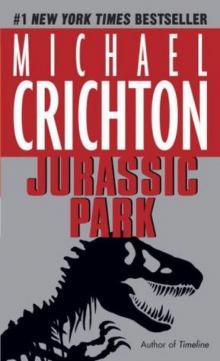 Jurassic Park
Jurassic Park Micro
Micro The Great Train Robbery
The Great Train Robbery The Andromeda Strain
The Andromeda Strain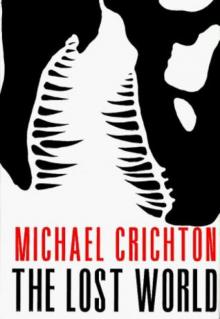 The Lost World
The Lost World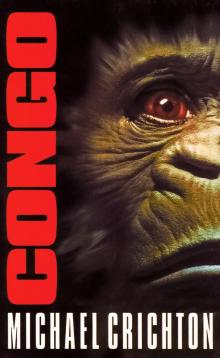 Congo
Congo Travels
Travels Timeline
Timeline Sphere
Sphere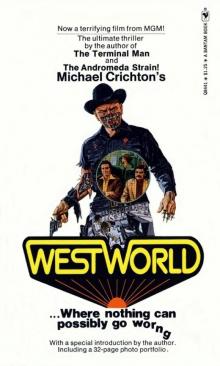 Westworld
Westworld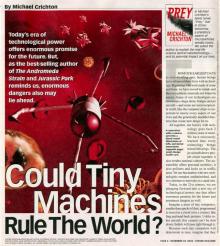 Prey
Prey State Of Fear
State Of Fear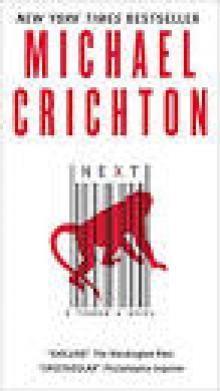 Next
Next Disclosure
Disclosure Pirate Latitudes
Pirate Latitudes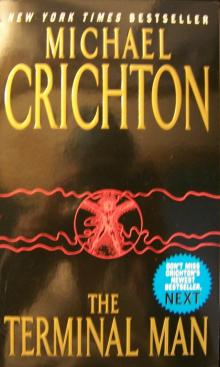 The Terminal Man
The Terminal Man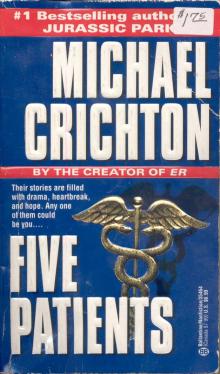 Five Patients
Five Patients Rising Sun
Rising Sun Binary
Binary The Andromeda Evolution
The Andromeda Evolution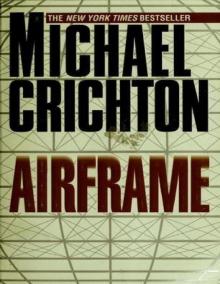 Airframe
Airframe Easy Go
Easy Go Drug of Choice
Drug of Choice Odds On: A Novel
Odds On: A Novel Scratch One
Scratch One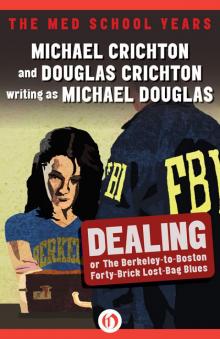 Dealing or The Berkeley-to-Boston Forty-Brick Lost-Bag Blues
Dealing or The Berkeley-to-Boston Forty-Brick Lost-Bag Blues Venom Business
Venom Business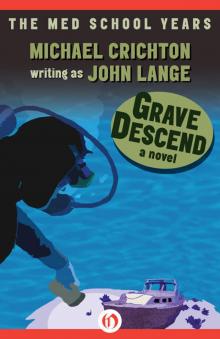 Grave Descend
Grave Descend Gold - Pirate Latitudes
Gold - Pirate Latitudes Binary: A Novel
Binary: A Novel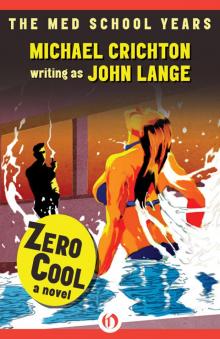 Zero Cool
Zero Cool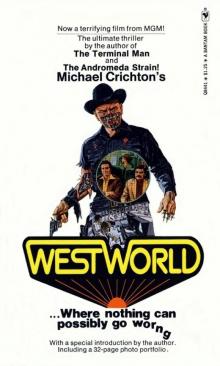 Delos 1 - Westworld
Delos 1 - Westworld